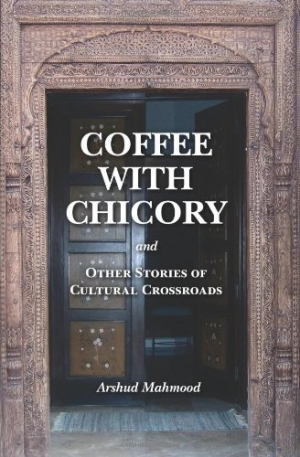Coffee With Chicory
And Other Stories of Cultural Crossroads
Coffee With Chicory feels and acts like three different books, and because the first section is so wonderful, one wants to forgive the regrettable slide in quality. Whereas the second section, which has some degree of continuity, never quite comes together; the final section, composed of two unrelated stories, feels like it dropped from outer space. This disjointedness makes for a confusing and disappointing read past the halfway mark of the book. Arshud Mahmood’s book of short stories begins superbly and finishes poorly.
The book opens with thirteen sequential, coming-of-age stories set in India and Pakistan during the 1940s and 1950s. Most take place in Quetta, a town near the Afghan border, where the protagonist’s Muslim family moved to escape the ethnic and religious violence surrounding the partition of India. All the stories are written in the voice of a precocious boy from a prosperous family (his father is a doctor) and follow him from the age of four through his college years. The first three stories are delightful introductions to the innocent passions of a little boy, from his love for mangoes and sugar cane, to learning how to read and falling for a storybook princess. Things suddenly get serious in the fourth story when the boy, while on a walk with his uncle, sees the brains spilling out of a body in the street. This shocking visage creates a perfect segue into a new and frightening world where traumatized strangers with crying children sleep on the veranda, adults talk in hushed tones, and the police confront the family out for an evening walk.
The boy’s move to Quetta exposes him to an entirely new world of perils, from enduring a math tutor to hungry religious students at the door. When one of the students needs a doctor for his sick mother, the boy accompanies his father to treat the woman, who remains hidden behind a sheet throughout the examination, diagnosis, and treatment. In another humorous vignette, the family’s servant is temporarily possessed by a saint to the delight of the local women who seek his advice. Tribal passions lead to soccer-field skirmishes in one story and the death of the boy’s two best friends in another. The characters in the first section are all well-developed, the plots are often riveting, funny, and poignant, and every story feels authentic.
The seven stories in the second section follow a grown man (the boy from the first section, one assumes) from one soil engineering assignment to another on oil rigs in Alaska and Louisiana. The stories are heavy on scenic details and contrived characters, and tend to drag.
Coffee With Chicory would be twice as good if it were half as long. Fortunately, one can read the first section and be sated, and it would be worth the price of the book.
Reviewed by
Patty Sutherland
Disclosure: This article is not an endorsement, but a review. The publisher of this book provided free copies of the book and paid a small fee to have their book reviewed by a professional reviewer. Foreword Reviews and Clarion Reviews make no guarantee that the publisher will receive a positive review. Foreword Magazine, Inc. is disclosing this in accordance with the Federal Trade Commission’s 16 CFR, Part 255.

